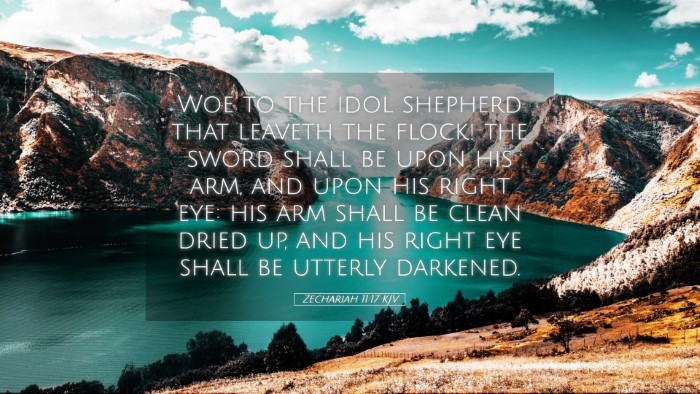Old Testament
Genesis Exodus Leviticus Numbers Deuteronomy Joshua Judges Ruth 1 Samuel 2 Samuel 1 Kings 2 Kings 1 Chronicles 2 Chronicles Ezra Nehemiah Esther Job Psalms Proverbs Ecclesiastes Song of Solomon Isaiah Jeremiah Lamentations Ezekiel Daniel Hosea Joel Amos Obadiah Jonah Micah Nahum Habakkuk Zephaniah Haggai Zechariah MalachiZechariah 11:17
Zechariah 11:17 KJV
Woe to the idol shepherd that leaveth the flock! the sword shall be upon his arm, and upon his right eye: his arm shall be clean dried up, and his right eye shall be utterly darkened.
Zechariah 11:17 Bible Commentary
Commentary on Zechariah 11:17
Verse Reference: Zechariah 11:17 - "Woe to the worthless shepherd, who leaves the flock! A sword shall be against his arm and against his right eye; his arm shall be completely withered, and his right eye shall be totally blinded."
Introduction
This verse from Zechariah conveys a profound warning against poor leadership within the community of God's people. It brings to light the consequences of shepherds (leaders) who neglect their duties, emphasizing the spiritual and moral obligations of those in positions of authority. This commentary synthesizes insights from respected public domain sources to deepen the understanding of this critical text.
The Worthless Shepherd
Meaning of "Worthless Shepherd": The term "worthless" here can denote a shepherd who fails in his responsibilities, thus neglecting the well-being of the flock. Matthew Henry notes that such leaders lack genuine concern and commitment, which are essential for the protection and guidance of their followers.
- Albert Barnes emphasizes that the phrase implies not only ineptitude but also a willful abandoning of one’s flock. Such shepherds may lead others astray, making them spiritually vulnerable.
- Adam Clarke connects this metaphor to both past and future leaders of Israel, illustrating that there is a significant weight to the role of a shepherd in biblical tradition, which reflects God's care for His people.
Consequences of Negligence
The verse articulates a severe judgment against the worthless shepherd, describing the impact of divine retribution: "A sword shall be against his arm and against his right eye.” This vivid imagery signals that the consequences of neglect extend not just to the flock but also to the leaders themselves.
- The Sword: The metaphor of the sword can represent judgment and destruction. This indicates the seriousness of failing in one’s duty as a leader, echoing the sentiments expressed by Matthew Henry, who suggests that God does not tolerate irresponsible leadership lightly.
- Arm and Eye: The arm and the right eye symbolize strength and vision. Thus, the withering of the arm signifies the loss of strength and ability to lead, while the blinding of the eye represents a lack of insight and understanding. This loss ultimately diminishes the leader’s capacity to protect and guide the flock. Albert Barnes comments on the stark imagery, saying it denotes the crippling consequences of such failure.
Theological Implications
This passage extends beyond its immediate context into broader theological reflections regarding leadership, responsibility, and divine justice. The "worthless shepherd" represents all who neglect their spiritual duties, not just in the Old Testament era, but also in any age, including the church today.
- Spiritual Accountability: The passage highlights the weighty responsibility that leaders bear before God and their followers. Adam Clarke stresses the necessity for leaders to embody integrity and commitment.
- God's Judgment: The severe decrees outlined in this verse remind us that God takes the misguidance of His people seriously. Effective leadership involves more than mere administration; it involves a deep, spiritual commitment to those led. Both Barnes and Henry emphasize the promise of divine intervention against those who exploit their authority.
Application for Today
For pastors, students, theologians, and biblical scholars, Zechariah 11:17 serves as a sobering reminder of the standards expected of spiritual leaders. It challenges individuals in leadership roles to self-examine their commitment and effectiveness. The traits of a godly shepherd are multifaceted and require diligence, wisdom, and humility.
- A Call to Integrity: Leaders are called to prioritize the well-being of their "flock" above personal gain, reflecting Christ's love and sacrifice.
- The Role of Accountability: Just as the passage indicates divine judgment for unfaithfulness, modern leaders must also foster an environment of accountability, encouraging transparency and communal support.
Conclusion
In conclusion, Zechariah 11:17 acts as both a warning and an encouragement to all in positions of influence within the community of believers. It emphasizes the dire consequences of failing to shepherd well and reaffirms the call for leaders to embody the characteristics of Christ. The insights drawn from the commentaries of Henry, Barnes, and Clarke collectively provide a comprehensive understanding of this significant text, challenging us to uphold the standards of spiritual leadership today.


